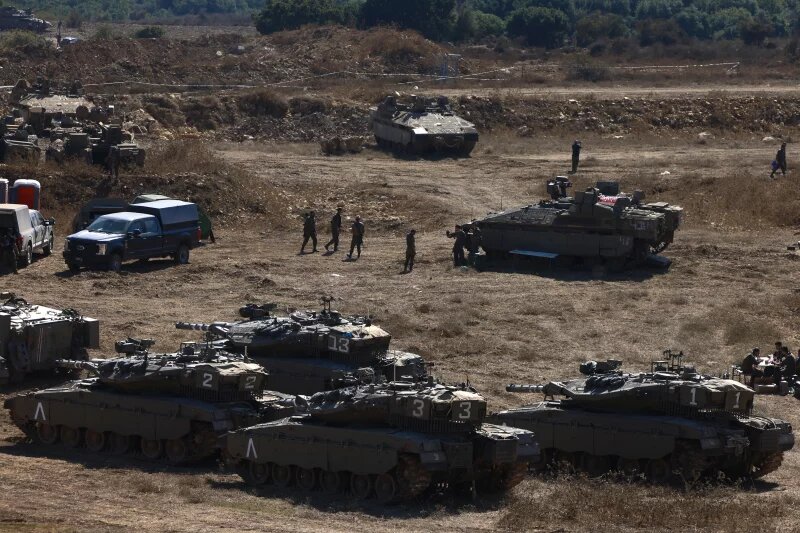Israel seeking to turn South Lebanon into a de facto buffer zone
Lebanon facing environmental, cultural, and military assaults

BEIRUT—Lebanon is experiencing a complex moment, facing continuous Israeli bombardment, severe political divisions, and increasing economic and diplomatic pressures.
Israel continues to target villages and towns from Bnaafoul to Ansar and Shamstar. It is terrorizing civilians and deterring them from working on their agricultural lands.
Amidst these Israeli acts, residents of the border villages insist on returning to their lands and harvest their crops.
This daily war on the border is not just military; it is also a war over land, memory, and identity. The enemy seeks to impose a new reality that makes the South a de facto buffer zone amidst the complicity of international silence and the Lebanese state’s failure to protect its citizens and their rights.
Since October 2023, the Israeli invasion has not been limited to daily shelling of southern towns, but has taken on an organized form, targeting symbol of both land and identity, that is to say olive groves.
As part of a deliberate policy to clear the border strip and create a buffer zone, Israel is using phosphorus bombs to burn olive groves and raze the soil between Lebanon and occupied Palestine.
Additionally, the occupation army has uprooted and stolen ancient trees and transported them into Palestinian territory, in an attempt to erase the agricultural and human memory of the south.
This is an environmental and cultural war as much as it is a military one. It is intended uproot the people.
In a parallel scene, the internal battle is manifesting itself in political and electoral aspects, as the struggle to amend the electoral law has reopened the lines of contact between traditional factions.
Parliament Speaker Nabih Berri has closed the door to any amendment, while the Lebanese Forces party has resorted to what it calls “Plan B,” attempting to pass a new draft law through the government.
Behind this controversy lie subtle calculations that go beyond legal texts. It is a battle for influence and representation, particularly in regard to the votes of expatriates, which are a valuable asset in the upcoming parliamentary elections.
As the dispute between Foreign Minister Youssef Rajai from the Lebanese Forces party and Prime Minister Nawaf Salam intensifies, the government’s inability to take a unified decision is becoming more evident. This comes as legislative and oversight paralysis is increasing in the country that has lost both its constitutional and economic compass.
Externally, Lebanon has returned to the forefront of international attention following French messages of support coupled with promises to hold two conferences to support the army and reconstruction.
However, this support is conditional upon delicate balances, as it is paralleled by a clear Saudi reticence to engage in any initiative.
This reflects the persistent chill between Riyadh and Beirut, driven by a lack of real reforms and the rising influence of Hezbollah-aligned forces.
Between French optimism and Saudi hesitation, the American position remains cautious and observant, linking any assistance to Lebanon’s commitment to the regional settlement, including indirect negotiations with Israel over the border.
However, neither Paris nor Washington appear capable of breaking the deadlock unless there is a unified Lebanese will, something that has so far been missing.
Added to this picture are significant political and security signals: an Israeli escalation targeting Speaker Berri’s areas of influence; a bombing campaign paralleling his refusal to negotiate with Berri before withdrawing from the occupied villages; frenzied electoral activity both domestically and abroad; and administrative and financial scandals that reflect the institutions’ inability to achieve accountability and reform.
Even the issues of living, from the contamination of the Tannourine drinking water company (affiliated with the Lebanese Forces) to the collapse of the accounting system, reveal the state’s fragility in the face of intertwined interests and the ongoing collusion between power and wealth.
This water issue transformed from a health issue into a sharp sectarian conflict after the Ministry of Health decided to stop bottling its products due to bacterial contamination.
Instead of a scientific debate on water safety, the Lebanese Forces launched an incitement campaign that described the decision as a political and sectarian targeting of a “Christian company” simply because the Minister of Health is affiliated with Hezbollah!
Thus, scientific facts were obscured and replaced by the language of hatred and division, in an attempt to exploit the health crisis to inflame sectarian hatred and achieve political gains at the expense of citizens’ safety.
Amidst this chaos, Lebanon appears to be an open arena for conflicting messages: Israel imposes a reality on the ground with fire, internal forces vie for scraps of power, foreign powers threaten conditional aid, and society groans under the weight of high prices and division.
Despite all this, the South remains a symbol of dignity and resistance. Farmers - under bombardment and facing displacement, starvation, and subjugation - harvest their olives that symbolize Lebanese survival.
What Lebanon is experiencing today is not merely a security, political and economy crisis. Rather, it is experiencing an existential struggle in a region that tests its ability to withstand a world whose alliances are rapidly shifting.
The choice for Lebanon is clear: achieve the unity needed to rebuild a state based on justice and sovereignty, or remain captive to internal contradictions that turn each Israeli raid or electoral conflict into a fresh challenge for a nation that has yet to secure its own survival.
Leave a Comment